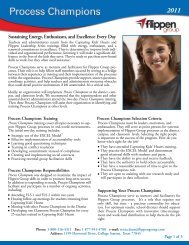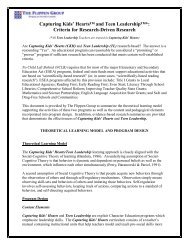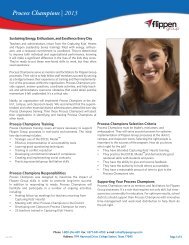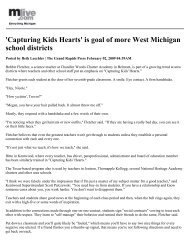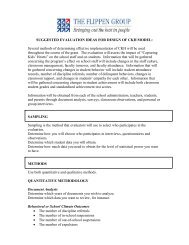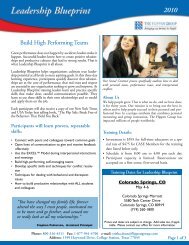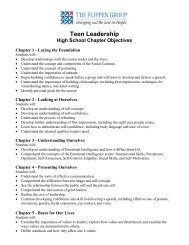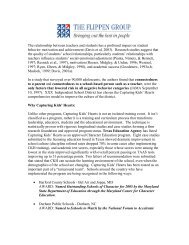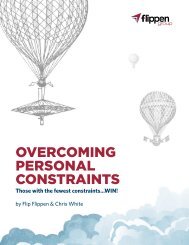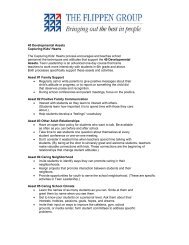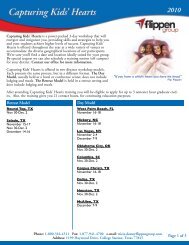CHAPTER 3: <strong>The</strong> Ethical Learning CommunityEndnotes1We are indebted to Dr. Harris B. Stratyner of Cornell University’sWeill Medical College for the term “care-frontation.”2W. Damon, J. Menon, & K.C. Bronk, “<strong>The</strong> development of purposeduring adolescence,” Applied Developmental Science, 2003, 7, 2,119-128.3K. Cotton, New small learning communities: Findings from recent literature.(Reston, VA: National Association of Secondary School Principals,2004); see also P. Walsey, “Small classes, small schools: <strong>The</strong>time is now,” Educational Leadership, 2002, 55, 5, 6-10.4M.D. Resnick, P.S. Bearman, R.W. Blum et al., “Protecting adolescentsfrom harm: Findings from the National Longitudinal Studyon Adolescent Health,” JAMA, 1997, 278, 823-832.5R. Elmore, “Building a new structure for school leadership,” <strong>The</strong>Albert Shanker Institute (Winter, 2000).6We thank Charles Elbot for the concept of “official” and “unofficialschool culture.”7Cited in C. Elbot, D. Fulton, & B. Evans, Educating for character inthe Denver Public <strong>Schools</strong>. (Denver, CO: Denver Public <strong>Schools</strong>, 2003).8Cited in D.L. McCabe & G. Pavela, “Some good news about academicintegrity,” Change Magazine (September/October 2000).9McCabe & Pavela.10McCabe, private communication, 2004.11McCabe.12J. McPhee, <strong>The</strong> headmaster: Frank L. Boyden of Deerfield. (New York:Farrar, Straus & Giroux, 1992).13Quoted in J. Mathews, “Why you shouldn’t teach moderate drinking,”www.washingtonpost.com (May 7, 2004).14<strong>The</strong> booklet, A Parent’s Guide for the Prevention of Alcohol,Tobacco and Other Drug Use, is available athttp://www.thecommunityofconcern.org/book/default.asp15Mathews.16National Longitudinal Study on Adolescent Health.17National Center on Addiction and Substance Abuse at ColumbiaUniversity, 2004 CASA national survey of American attitudes on substanceabuse IX: Teen dating practices and sexual activity (2004).18See also B.C. Miller et al., “Dating age and stage as correlates ofadolescent sexual attitudes and behavior,” Journal of AdolescentResearch, 1986, 1, 3.19K.A. Moore & J. Zaff, “Building a better teenager: A summary of‘what works’ in adolescent development,” Child Trends Research Brief,www.childtrends.org (November 2002).20National Center on Addiction and Substance Abuse, 2004.21P. Silva & R.A. Mackin, Standards of mind and heart: Creating thegood high school. (New York: Teachers College Press, 2002).22J.S. Eccles et al., “Development during adolescence: <strong>The</strong> impactof stage-environment fit on young adolescents’ experiences inschools and families,” American Psychologist, 1993, 48, 90-101.23F.C. Power, A. Higgins, & L. Kohlberg, Lawrence Kohlberg’s approachto moral education. (New York: Columbia University Press, 1989).24E.A. Grady, After cluster school: A study of the impact in adulthood of amoral education intervention project. Unpublished doctoral dissertation,Harvard University, 1994.25R. Mosher (Ed.), Moral education: A first generation of research anddevelopment. (New York: Praeger, 1980).26H.J. Freiberg, “Turning around at-risk schools through consistencymanagement,” Journal of Negro Education, 1989, 58, 372-382.27http://www.indiana.edu/~nsse/hssse/28R. Allen, “Making high schools better,” Education Update (August,2004).29R. Gamrath-Schauman & D. Stirling, Students as allies: St. Louis (St.Louis: CharacterPlus, 2004).30For an example of an exit survey, see R. Stein, R. Richin, R. Banyon,F. Banyon, & M. Stein, Connecting character to conduct: Helping studentsdo the right thing. (Alexandria, VA: Association for Supervisionand Curriculum Development, 2000).31S. Berman, “Practicing democracy in high school,” EducationalLeadership (September 2003), 38.32R. Mosher et al., Preparing for citizenship. (Westport, CT: Praeger,1994).33Power, Higgins, & Kohlberg.34F.C. Power, “Democratic schools and the power of moral authority,”in W.M. Kurtines & J.L. Gewirtz (Eds.), Handbook of moral behaviorand development, vol. 3. (Hillsdale, NJ: L. Erlbaum Associates,1991).35Forthcoming from M. Berkowitz & M. Bier at www.character.org.For unpublished manuscript contact berkowitz@umsl.edu36J. Gauld, Hyde: Preparation for life. (Bath, ME: <strong>The</strong> Hyde Foundation,2003).37R. Berger, An ethic of excellence. (Portsmouth, NH: Heinemann,2003).38B. Bloom (Ed.), Developing talent in young people. (New York: BallatineBooks, 1985).39D. Popenoe, “<strong>The</strong> roots of declining social virtue: Family, community,and the need for a ‘natural communities’ policy,” in M.A. Glendon& D. Blankenhorn (Eds.), Seedbeds of virtue. (New York: MadisonBooks, 1995).40F.A. Ianni, <strong>The</strong> search for structure: A report on American youth today.(New York: Free Press, 1989).41T. Lickona, Character matters. (New York: Touchstone, 2004).42Stratyner.43J.C. Gibbs, Moral development and reality (Thousand Oaks, CA: SagePublications, 2003).44Gauld.45L. Gauld & M. Gauld, <strong>The</strong> biggest job we’ll ever have: <strong>The</strong> Hyde Schoolprogram for character-based education and parenting. (New York: Scribner,2002).As our character grows, our egodiminishes.—LOUIS TARTAGLIA60<strong>Smart</strong> & <strong>Good</strong> <strong>High</strong> <strong>Schools</strong>
CHAPTER 4<strong>The</strong> Professional Ethical Learning Community (PELC):Faculty and Staff Collaboratingto Integrate Excellence and EthicsFaculty need to meet and talk about what’s going well intheir classes, what’s not, who’s excelling, who needs help,and how students can help each other. If teachers startmaking an investment in how the school and classroomsrun, then students would be more motivated because theyare being shown what motivation, investment, and goal-settinglook like. But it must start with faculty seeking to fulfilltheir vision.—A HIGH SCHOOL GIRLA good school is not one that is merely “effective” in raisingtest scores. <strong>The</strong>re is a concern [on the part of all staff]for rigorous academic education but also for the qualities ofendurance, resilience, responsibility, resourcefulness, andsocial concern . . . Intellectual and moral virtue are seen asinseparable. 1—GERALD GRANTAll of us—Board members, administrators, faculty, supportstaff, and students—are asked to be role models. When Iwalk through the school building, I always look for opportunitiesto pick up trash. I don’t find any. That’s because5,000 people here pick up trash. Collective commitmentsare very important.—A SCHOOL BOARD MEMBERWhat makes it possible to create a <strong>Smart</strong> &<strong>Good</strong> <strong>High</strong> School dedicated to a missionof excellence and ethics? Where does theleadership come from to develop an ethicallearning community in which faculty and staff, students,parents, and the wider community support and challengeeach other to do their best work (performance character)and be their best ethical self (moral character)?<strong>The</strong> essential leadership for this effort comes from theProfessional Ethical Learning Community (PELC). Wedefine this professional community to include schoolleaders and all instructional and support staff—not onlyadministrators, teachers, and counselors but also secretaries,coaches, custodians, cafeteria workers, bus drivers,and all others whose work and example affect excellenceand ethics in ways large and small. Every adult makes adifference; everyone contributes, positively or negatively,to the character of the school and the character of students.Our vision of PELC builds on the seminal work ofRichard Dufour and Robert Eaker in their book ProfessionalLearning Communities at Work. 2 Dufour and Eakerhave helped to transform education from a professionwhere teachers and other staff worked largely in isolationand were guided by intuition, to one of data-driven collaboration.<strong>The</strong> Professional Ethical LearningCommunity includes all school staff.Our concept of the PELC, however, expands Dufour’sand Eaker’s professional learning community to includean explicit and integrated focus on both excellence andethics. <strong>The</strong> mission of a <strong>Smart</strong> & <strong>Good</strong> <strong>High</strong> School isn’tto be just a “learning community”; it’s to be an ethicallearning community, one that is committed to the integrationof excellence and ethics—performance characterand moral character. Similarly, the collegial mission offaculty and staff is not simply to be a professional learningcommunity; it’s to be a professional and ethical learningcommunity. All members of the PELC have two definingcommitments: (1) to strive to be excellent in their workand ethical in their behavior; and (2) to help and challengeeach other in their shared task of fostering excellenceand ethics in students.Academic excellence itself presupposes universalethical values: honesty, compassion,empathy, integrity, commitment, andcourage. Who wants students who cheat, failto enter empathically into the inner word ofa book’s characters, perform their chemistryexperiments perfunctorily without commitment,and slant their judgments to pleasetheir teachers? We must reveal to our studentsthe intrinsically ethical nature of thepursuit of truth.—DOUGLAS HEATH61<strong>Smart</strong> & <strong>Good</strong> <strong>High</strong> <strong>Schools</strong>



